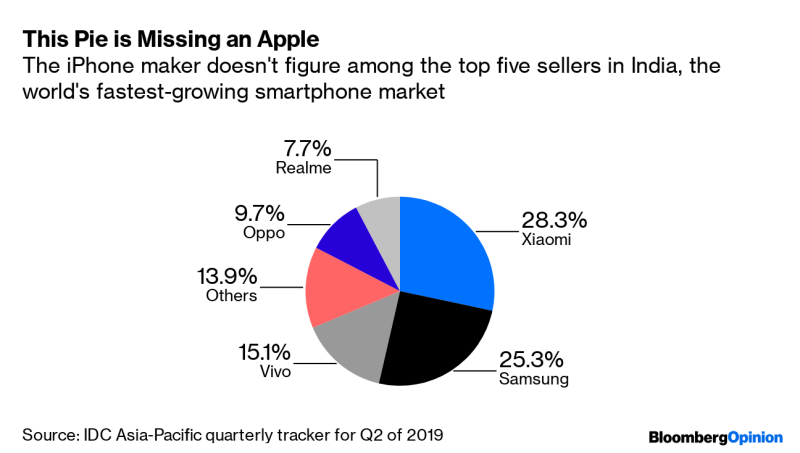

(Bloomberg Opinion) — The beleaguered Indian economy is finally making a sensible bargain with the rest of the world: “Take our billion-plus customers, give us jobs.”
Under a new foreign direct investment policy announced by Prime Minister Narendra Modi’s government Wednesday, India is undertaking its biggest liberalization of single-brand retail in seven years. One major concession: Contentious local sourcing requirements will need to be met as an average for the first five-year period, not annually.
That’s a big help to Apple Inc., which will no longer have to struggle with a 30% local procurement norm to open its long-awaited own store in India and will now have time to scale up what it buys from Taiwanese contractor Wistron Corp.’s Bangalore factory.
Nor will it be necessary for companies to back every dollar of Indian revenue with 30 cents of domestic sourcing. The likes of Ikea or H&M already source from India for their stores globally. But now they’ll get credit for it.
Ikea, for instance, has previously said that it might be buying $667 million in furnishings, furniture and trinkets from India by 2020. Under the new rules, it can then sell goods worth $2.2 billion in India annually – even if all of it is made in China or Bangladesh. If it wants more headroom for expansion, it needs to buy more from the country for international markets.
Similarly, Apple, which tests the assembly of its latest iPhone X in a Foxconn Technology Group factory near Chennai, can step up the engagement to include other devices it sells globally.
The reforms have been years in the making. Beset by corruption scandals and accusations of policy paralysis, the previous prime minister, Manmohan Singh, had risked splintering his unwieldy coalition government in 2012 to open up the closely protected consumer market, paving the way for Ikea to finally open its first store in India in 2018 – after a 12-year wait.
Singh’s reforms came too late. By the summer of 2013, investors were making a beeline for the exit. His government fell the next year. The situation now has differences and similarities. Having just returned for a second term with a thumping majority, Modi is far more secure politically. But the economy is once again floundering. Six out of eight high-frequency indicators tracked by Bloomberg worsened in July. Auto sales are crashing and a crisis of confidence in the financial industry is threatening to spiral out of control.
With unemployment at a 45-year high and consumption sputtering in rural areas, the three export-oriented industries that can create the most jobs for the country’s bulging youth population are textiles, electronics and auto. Multinationals that want a slice of India’s spending are being told to help expand the middle class first.
As I wrote recently, New Delhi is no longer in denial, though it doesn’t have a good strategy to counter the slowdown.
The pragmatic stance taken on retail is the first good step that goes beyond damage control and toward filling a strategic gap. To sweeten the deal some more for Apple, New Delhi will allow it to sell online to Indian device buyers as long as the Cupertino, California-based company opens a physical store in two years. An online store for India is something Apple is poised to start within months, Bloomberg News reported Thursday.
Apple’s eagerness is easy to explain. For one thing, the damage being done to the iPhone’s brand premium through heavy discounting by resellers on marketplaces run by Amazon.com Inc. and Walmart Inc.-owned Flipkart will be contained. India is the world’s fastest-growing smartphone market and Apple’s share is less than 2%. However, while demand for $400 to $600 smartphones is currently modest, this top end of the Indian market is still growing at a rapid 16% rate.
To play freely, what can Apple make in India and export to the world? For now, some amount of software (something India is good at) and assembly and packaging of devices may have to suffice.India isn’t really plugged into the global electronics supply chain. The trade war between Washington and Beijing is reshaping things, but those leaving China are more inclined to relocate to Vietnam, where Google may move production of its Pixel smartphone, according to Nikkei. To make a success of the new retail policy, India must shed its notorious reputation of being an exporter-unfriendly place.
Importing components to re-export finished goods is a customs nightmare. For example, the government may deny a waiver of import duty if what came into the country were tires and an axle and what went out was a trailer. With less red tape, and even small improvements in infrastructure, India’s customers-for-jobs bargain could start to pay off.
To contact the author of this story: Andy Mukherjee at [email protected]
To contact the editor responsible for this story: Patrick McDowell at [email protected]
This column does not necessarily reflect the opinion of the editorial board or Bloomberg LP and its owners.
Andy Mukherjee is a Bloomberg Opinion columnist covering industrial companies and financial services. He previously was a columnist for Reuters Breakingviews. He has also worked for the Straits Times, ET NOW and Bloomberg News.
<p class="canvas-atom canvas-text Mb(1.0em) Mb(0)–sm Mt(0.8em)–sm" type="text" content="For more articles like this, please visit us at bloomberg.com/opinion” data-reactid=”40″>For more articles like this, please visit us at bloomberg.com/opinion
©2019 Bloomberg L.P.












